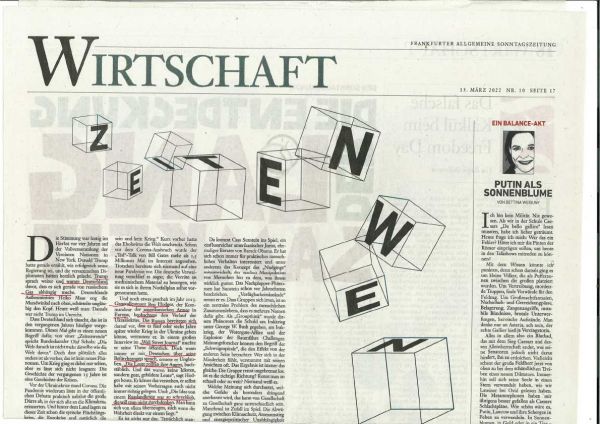Putin and Merkel
Here in Germany, it seems that former Chancellor Angela Merkel and the people who served under her are coming under criticism for their handling of relations with Vladimir Putin--more so than even Trump has in America. In an article in the Frankfurter Allgemeine newspaper on Sunday March 13, titled "Zeitenwende." the author Patrick Bernau makes the following statements: "During the General Assembly of the United Nations, four years ago, President Donald Trump warned German leaders that Germany was becoming too dependent on Russian natural gas."
At that time, Merkel was also trying to wind down Germany's dependence on nuclear power. She inadvertently put Germany into a serious energy-bind. Even at the time, many doubted the wisdom of her intention.
Bernau goes on to say the following: "In 2015, Lieutenant-General Ben Hodges, the Commander of American Forces in Europe during the Obama administration, was following the developing crisis in the Ukraine. The Russian military was preparing itself for another military action there. . . . When he met with German officials of the Merkel administration to warn them of his observations, the Germans rolled their eyes in disbelief. 'These were trained, informed government officials,' said General Hodges, and added, 'I didn't want to believe it myself. The idea of another war was terrible. You don't want to believe it, even if the evidence of war is directly in front of you.'"
The point Bernau raises in his article is not simply that no one wants to believe the evidence. Governments face "crises" everyday that they are in office. They face warnings from every quarter of the society--global warming, plastic containers in the ocean, inflation, and indebtedness. Everyone wants solutions to their personal "crisis" yesterday. But how many "crises" can a government deal with in the context of a parliamentary government with an opposition-party that hates everything you stand for? The pressure on governments and their leaders to everything the public wants, or demands, makes their efforts sort of chaotic.
Also, what one party sees as a "crisis," the other party sees as the desirable status quo. The perception of crisis is largely a political red herring, but don't bother to dissuade the true-believers. They keep the public dialogue hopelessly ramped up. That's not the only problem. The complete political exclusivity of the "crisis" lists of each party means that no single party can or wants to deal with everything, unless it gets into power.
The public clearly needs to mature, regarding the limitations of parliamentary government. If your people have a clearly-defined crisis-list, they need to deal it as an independent nation, and not as a striver overcoming the opposition.

